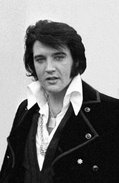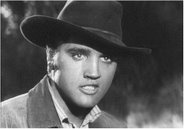On December 20, 1957, Presley received his draft board notice for his mandatory service in the United States Army. He was worried that his absence in the public eye for 2 years, while serving in the Army, might end his career. Even more worried were Hal Wallis and Paramount who already spent $350,000 on pre-production of Presley's latest film King Creole and they feared of suspending the project or worse canceling it. Fortunately, the Memphis Draft Board granted Wallis and Colonel Parker a deferment until March 20 so Presley could complete his film project. On 24 March 1958, Presley joined his unit, 1st Battalion, US 32nd Armored Regiment and was posted to Ray Barracks, Friedberg, Germany.
"In the army he was forced into interaction with strangers. This is where Elvis developed the gruff, macho and boastful nature as a mode of survival," says Peter Guralnick. "He'd always been the chief and now he had to be a scout." While serving in Germany, Presley met his wife-to-be, the 14-year-old Priscilla Beaulieu, and also the noted International Herald Tribune correspondent and humorist Art Buchwald, future US Secretary of State Colin Powell (then a lieutenant with the Third Army Division in Germany), and Walter Alden, the father of Presley's fiancee Ginger Alden who inducted Presley into the Army.
His rankings and dates of promotions were as follows: Private (upon draft March 24, 1958); Private First Class (November 27, 1958); Specialist Fourth Class (June 1, 1959); and Sergeant (January 20, 1960). While in the Army, he earned sharpshooter badges for both the .45 pistol and the M1 rifle, and a marksman badge for the M2 carbine, as well as a Good Conduct Medal.
Presley returned to the United States on March 2, 1960, and was honorably discharged with the rank of Sergeant (E-5) on March 5. One of his post-discharge photos shows him wearing dress blues with the grade of Staff Sergeant (E-6), but this was a tailor's error.
After serving his duty in the military, he became more mature and lost his raw and rebellious edge. In his book, Elvis, Albert Goldman writes that, after his return to America, Presley "was a changed man. His first TV appearances, particularly his queer showing on Frank Sinatra Welcome Home Party for Elvis Presley, testify to the change in the man that underlay the change in the image. After the Army, Elvis appeared very delicate and vulnerable, as if he were recovering from major surgery. He wringed his hands as he talked. He became extremely wary. With his preposterous Little Richard conk, his limp wrist, girlish grin and wobbly knees, which now turned out, instead of in, he looked outrageously gay." However, he gained respect from older and more conservative crowds who initially disliked him before he entered the Army.
skip to main |
skip to sidebar

Elvis Presley

Elvis Presley
Elvis Presley: Biography, Music, Movies
Elvis Presley

Elvis Presley
Blog Archive
-
▼
2007
(32)
-
▼
March
(32)
- Elvis Presley
- Elvis Presley - Origin of the surname
- Elvis Presley - Early life
- Elvis Presley - Voice characteristics
- Elvis Presley - Sun recordings
- Elvis Presley - Presley and his manager "Colonel" ...
- Elvis Presley - Presley and African American music
- Elvis Presley - A danger to American culture?
- Elvis Presley - American icon
- Elvis Presley - Military service
- Elvis Presley - 1960s film career
- Elvis Presley - 1968 comeback
- Elvis Presley - 1969-1977 - Elvis's final years
- Elvis Presley - Abuse of drugs
- Elvis Presley - Death and burial
- Elvis Presley - Controversy surrounding death
- Elvis Presley - Political beliefs
- Elvis Presley - Devotion to his mother
- Elvis Presley - High school and early stardom
- Elvis Presley - The women in his life
- Elvis Presley - Anita Wood and Priscilla Beaulieu
- Elvis Presley - Last relationships
- Elvis Presley - The Memphis Mafia and other male f...
- Elvis Presley - Lasting legacy
- Elvis Presley - The fans
- Elvis Presley - The ritualization of the "Elvis cult"
- Elvis Presley - Critical voices
- Elvis Presley - The Elvis religion
- Elvis Presley - Presley in the 21st century
- Elvis Presley - Elvis lives?
- Elvis Presley - FBI files on Presley
- Elvis as a victim of blackmail
-
▼
March
(32)
Elvis Presley

Elvis Presley
Elvis Presley Films
1956 Love Me Tender
1957 Loving You
1957 Jailhouse Rock
1958 King Creole
1960 G.I. Blues
1960 Flaming Star
1961 Wild in the Country
1961 Blue Hawaii
1962 Follow That Dream
1962 Kid Galahad
1962 Girls! Girls! Girls!
1963 It Happened at the World's Fair
1963 Fun in Acapulco
1964 Kissin' Cousins
1964 Viva Las Vegas
1964 Roustabout
1965 Girl Happy
1965 Tickle Me
1965 Harum Scarum
1966 Frankie and Johnny
1966 Paradise, Hawaiian Style
1966 Spinout
1967 Easy Come, Easy Go
1967 Double Trouble
1967 Clambake
1968 Stay Away, Joe
1968 Speedway
1968 Live a Little, Love a Little
1969 Charro!
1969 The Trouble with Girls
1969 Change of Habit




No comments:
Post a Comment